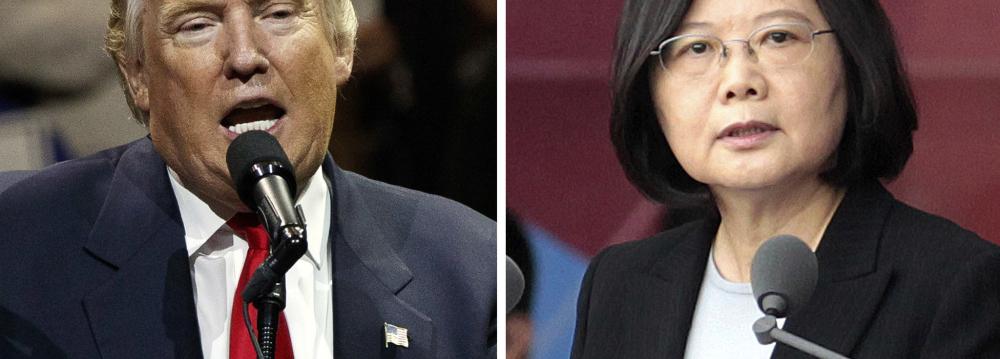In a break with decades-long diplomatic tradition and in an unprecedented act, US president-elect Donald Trump spoke directly with the president of Taiwan, a move that drew an irritated response from China.
In first comments apparently meant to downplay the significance of the call, Chinese Foreign Minister Wang Yi said the contact between Taiwan’s president and Trump was “just a small trick by Taiwan” that he believed would not change US policy toward China, according to Hong Kong’s Phoenix TV.
“The one-China policy is the cornerstone of the healthy development of China-US relations and we hope this political foundation will not be interfered with or damaged,” Wang was quoted as saying by AP.
Washington has pursued a so-called “one China” policy since 1979, when it shifted diplomatic recognition of China from the government in Taiwan to the government on the mainland. Under that policy, the US recognizes Beijing as representing China but retains unofficial ties with Taiwan.
A statement from Trump’s transition team said he spoke on Friday with Taiwanese President Tsai Ing-wen, who offered her congratulations.
Trump tweeted later that Tsai “CALLED ME”. He also groused about the reaction to the call: “Interesting how the US sells Taiwan billions of dollars of military equipment but I should not accept a congratulatory call.”
The Taiwanese presidential office said Trump and Tsai discussed issues affecting Asia and the future of US relations with Taiwan.
“The [Taiwanese] president is looking forward to strengthening bilateral interactions and contacts as well as setting up closer cooperative relations,” the statement said.
Tsai also told Trump that she hoped the US would support Taiwan in its participation in international affairs, the office said, in an apparent reference to China’s efforts to isolate Taiwan from global institutions such as the United Nations.
It said the two also discussed “promoting domestic economic development and strengthening national defense” to improve the lives of ordinary people.
Taiwan’s presidential office spokesman, Alex Huang, said separately that Taiwan’s relations with China and “healthy” Taiwan-US relations can proceed in parallel. “There is no conflict (in that),” he told reporters in Taipei.
The White House learned of the conversation after it had taken place, said an anonymous senior Obama administration official.
Educating Trump
Friday’s call is another example of how Trump has flouted diplomatic conventions since he won the November 8 election. He has apparently undertaken calls with foreign leaders without guidance customarily lent by the State Department, which oversees US diplomacy.
Following the phone call, Bonnie Glaser, senior adviser for Asia at the Center for Strategic and International Studies in Washington, D.C. said “[Chinese] will hope that this is a misstep but I think privately, they will definitely seek to educate this incoming president and ensure that he understands the sensitivity of Taiwan.”
In particular, China would want to highlight to the incoming administration the risks involved in any form of signal from the United States that it supports strengthening a relationship with Taiwan under a president that Beijing views as pro-independence, Glaser added.
Trump had just last month had a call with Chinese President Xi Jinping during which Trump’s office described him as saying he believed the two would have “one of the strongest relationships for both countries”.
“Despite China’s muted response on Saturday, concern about Trump’s policy toward China is growing,” said Shi Yinhong of Renmin University in Beijing, one of China’s best-known international relations scholars.
“In the mind of Chinese leaders, concerns are mounting over about US policy toward China” under Trump’s administration, Shi said.
The call with Trump could “convince people in Taiwan that the island can establish good relations with the US and encourage (Tsai) to continue to resist pressure from Beijing”, Shi added.
Over the decades, the status of Taiwan has been one of the most sensitive issues in US-China relations. China regards Taiwan as part of its territory to be retaken by force, if necessary, if it seeks independence. It would regard any recognition of a Taiwanese leader as a head of state as unacceptable.
Ned Price, a spokesman for the White House National Security Council, said Trump’s conversation does not signal any change to longstanding US policy on cross-strait issues.
In Beijing, a US business group said it expected the new US administration to respect the status quo.
“American business operating in Asia needs certainty and stability,” said James Zimmerman, chairman of the American Chamber of Commerce in China. “The new administration needs to get up to speed quickly on the historical tensions and complex dynamics of the region.”
Highlight: The new US administration needs to get up to speed quickly on the historical tensions and complex dynamics of the region


